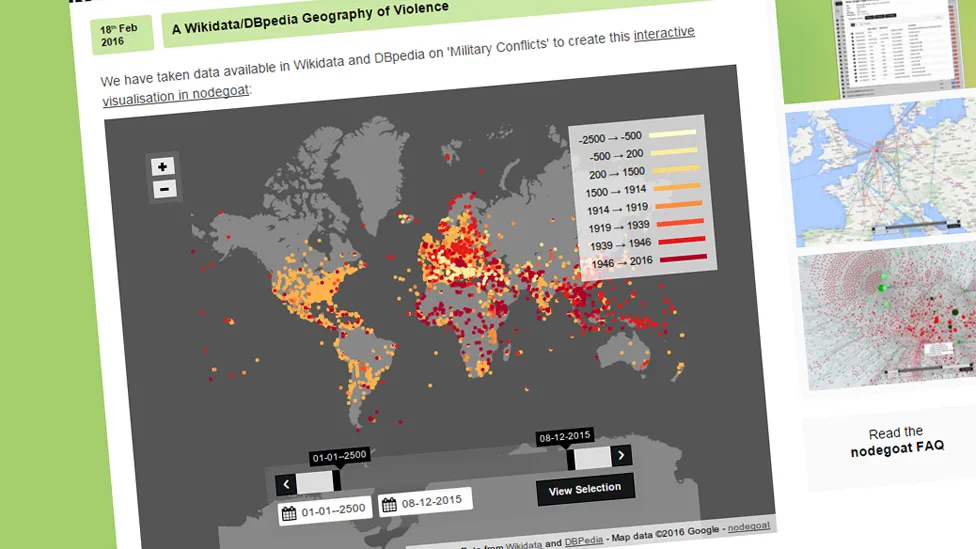
You may've heard of this map trying to record every battle ever fought throughout recorded human history. Based on Wikipedia:
LINK



 I think we could categorize "revisionist history" more narrowly, as the attempt to change the current understanding of history to hide, or to justify, immoral acts. The most immediate version of this is what we could call propaganda. Russia is currently attempting this in Ukraine, in real-time, by using revised laws, threats, new textbooks, and so on, to effectively erase Ukrainian identity. In a move that is either astoundingly ironic or completely unsurprising - I can't decide which - the Russian government is doing this under the cover of a justification that they are fighting "nazis" in Ukraine.
I think we could categorize "revisionist history" more narrowly, as the attempt to change the current understanding of history to hide, or to justify, immoral acts. The most immediate version of this is what we could call propaganda. Russia is currently attempting this in Ukraine, in real-time, by using revised laws, threats, new textbooks, and so on, to effectively erase Ukrainian identity. In a move that is either astoundingly ironic or completely unsurprising - I can't decide which - the Russian government is doing this under the cover of a justification that they are fighting "nazis" in Ukraine.

The USA will never admit that the follies of the New American Century led straight to the Russian War, for how can it? It would require an honest reckoning with just what its army and air force were unleashing across wide swathes of Asia and parts of Africa and why it was doing this.
It would require accepting that the line of Fallujah and Mariupol is a thin one, that both were exercises in wanton barbarism and folly, and that the inefficiencies of prewar regimes do not by their existence justify the hubris of empires in thinking they can overthrow them in a matter of marching. It would require admitting that US power no less than Russian has seen its teeth drawn, that the USA's arrogance made the world a more dangerous place, not a less dangerous one. That the so-called global lawman has proven yet another empire like all the others and the USA's damage to Baghdad may not quite match that of Hulagu Khan but it was more for the USA not being willing to use Vietnam War-tier destruction in the Information Age (though judging by the fanboys of Milosevic and Putin perhaps it should have. There is always a crowd that thirsts to be voyeurs to genocide and slavishly yield to a stronger force).
That, in the end, is the legacy of the war begun 19 years ago. Devastation, the revival of the premise that empires can act at will, the recurrence of the 1990s mentality that stopping genocides is infinitely worse than perpetrating them......and the reality that now both of the world's most powerful armies are failing and wrecking themselves in the course of entirely avoidable wars that have gone on too long. The world as it is is going to keep changing. History has not stopped, and all empires fall.
 Even with the global economic downturn due to the pandemic, there is a revived interest in workers' cooperatives as an alternative business structure. A great deal of the interest is simply factual. A summary of research [1] from Virginie Perotin of Leeds University Business School takes into account material from the past two decades and from across North and South America and Europe comes to the conclusion that productivity, employment, and employee well-being is typically improved in cooperatives than conventional businesses and that workers' cooperatives are more resilient. Whilst it is true that workers' cooperatives are a relatively small part of the global economy, they do raise some very interesting questions with regard to political economy: are workers' cooperatives a variation on capitalism, a type of socialism, or something else entirely? Do they represent some transitional state of affairs, and could society as a whole operate as one or many workers' cooperatives?
Even with the global economic downturn due to the pandemic, there is a revived interest in workers' cooperatives as an alternative business structure. A great deal of the interest is simply factual. A summary of research [1] from Virginie Perotin of Leeds University Business School takes into account material from the past two decades and from across North and South America and Europe comes to the conclusion that productivity, employment, and employee well-being is typically improved in cooperatives than conventional businesses and that workers' cooperatives are more resilient. Whilst it is true that workers' cooperatives are a relatively small part of the global economy, they do raise some very interesting questions with regard to political economy: are workers' cooperatives a variation on capitalism, a type of socialism, or something else entirely? Do they represent some transitional state of affairs, and could society as a whole operate as one or many workers' cooperatives? /https://tf-cmsv2-smithsonianmag-media.s3.amazonaws.com/filer/George-Washington-Mount-Vernon-1853-631.jpg)
 The sudden fall of Afghanistan into the hands of the Taliban may have shocked establishment experts [1], but are certainly no surprise to those expert critics who for decades have criticised the corruption, the lack of strength in civil institutions, and the disparity between what Western governments told us and what reality was like on the ground [2]. That reality is approximately 175,000 dead, mainly Afghan national military and police, Taliban and other opposition fighters, and civilians. One could add an additional 67,000 for the Pakistani side of The Durand Line [3], a British imperialist invention that divides the indigenous Pashtuns and is treated with complete contempt by those on both sides of the border; all quite a remarkable achievement by the US after spending 2.261 trillion dollars on consolidating a military presence in a country of less the 40 million. Certainly, a windfall for those capitalists who invested in the war machine; returns on the top five defense contractors from 2001 to now have a return 50% greater than the general stock market [4].
The sudden fall of Afghanistan into the hands of the Taliban may have shocked establishment experts [1], but are certainly no surprise to those expert critics who for decades have criticised the corruption, the lack of strength in civil institutions, and the disparity between what Western governments told us and what reality was like on the ground [2]. That reality is approximately 175,000 dead, mainly Afghan national military and police, Taliban and other opposition fighters, and civilians. One could add an additional 67,000 for the Pakistani side of The Durand Line [3], a British imperialist invention that divides the indigenous Pashtuns and is treated with complete contempt by those on both sides of the border; all quite a remarkable achievement by the US after spending 2.261 trillion dollars on consolidating a military presence in a country of less the 40 million. Certainly, a windfall for those capitalists who invested in the war machine; returns on the top five defense contractors from 2001 to now have a return 50% greater than the general stock market [4].